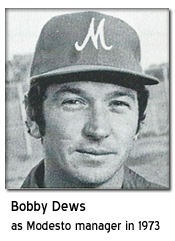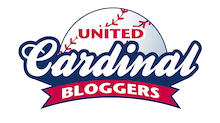As a longtime player, coach and manager in the Cardinals’ system, perhaps the most important contribution Bobby Dews made was helping Bob Forsch take a successful step in transforming from a third baseman into a pitcher.
 Dews was manager of the Cardinals’ 1971 Class A club at Cedar Rapids, Iowa. Forsch, a 26th-round draft choice who had flopped as a third-base prospect, was in his first full season as a starting pitcher. At 21, his playing career was at a crossroads.
Dews was manager of the Cardinals’ 1971 Class A club at Cedar Rapids, Iowa. Forsch, a 26th-round draft choice who had flopped as a third-base prospect, was in his first full season as a starting pitcher. At 21, his playing career was at a crossroads.
With Dews as his manager, Forsch had a successful year, posting an 11-7 record and 3.13 ERA in 23 starts for Cedar Rapids. He ranked second on the team in both innings pitched (158) and strikeouts (134). That performance convinced the Cardinals Forsch had potential as a pitcher.
Three years later, Forsch debuted with the Cardinals and went on to a productive career with them.
Bobby Dews helped him get there.
Dews was in the Cardinals’ organization from 1960 to 1974 before joining the Braves as a minor-league manager. He remained with the Braves in various roles, including big-league coach, until he retired in 2012.
Shortstop prospect
Dews was a varsity baseball and basketball player at Georgia Tech. He launched his professional baseball career when signed by the Cardinals in 1960.
Shortstop was Dews’ primary position, though he also played at second base and in the outfield.
His best season as a player in the Cardinals’ system was with Class AA Tulsa in 1964. Dews batted .277 that year with 30 stolen bases.
Dews was promoted to Class AAA Jacksonville in 1965, but his progress was slowed when he underwent surgery for a ruptured spleen on May 18, 1965.
For Dews, who had little power, the highlight of his 1965 season occurred when he hit home runs on consecutive nights (July 22-23) against Rochester.
The first of those home runs was hit against Darold Knowles, a future Cardinals reliever. “That was strictly a shot in the dark,” Dews told The Sporting News. “I didn’t know what he threw or where it was.”
The next night, Dews hit a home run against Bill Short, who had pitched for the 1960 American League champion Yankees. Said Dews: “Bill threw me a fastball and I think he thought I was going to take it. Instead, I hit it. Isn’t that real crazy?”
In 1966 with Class AA Arkansas, Dews played all nine positions in the Sept. 5 regular-season finale against Austin. Arkansas manager Vern Rapp pitched two hitless innings in the game.
Dews was a player-coach in the Cardinals’ system in 1967 and 1968.
Learning to manage
At 30, Dews was named manager of the Cardinals’ 1969 Class A club in Lewiston, Idaho. One of his players was Forsch, 19, who was in his second professional season as a third baseman. Forsch hit .203 in 26 games for Lewiston.
Dews was a coach for Tulsa manager Warren Spahn in 1970. After that, Dews was assigned to manage Cardinals farm clubs in each of the next four seasons: Cedar Rapids in 1971, Sarasota in 1972, Modesto in 1973 and Sarasota again in 1974.
Besides Forsch, two of the future big-leaguers Dews managed in the Cardinals’ system were outfielders Hector Cruz at Cedar Rapids and Mike Vail at Modesto.
Life after Cardinals
In 1975, Dews was named manager of the Braves’ Class A Greenwood team in the Western Carolinas League.
His most prominent roles with the Braves were as a big-league coach under manager Bobby Cox from 1979-81 and from 1997-2006.
In an interview with MLB.com, Cox said of Dews: “He was a special guy. He helped so much in getting this organization going.”
Dews also wrote books, the best-known of which was “Legends, Demons and Dreams,” a collection of short stories.
“My grandfather wanted me to be a lawyer and a writer,” Dews told Jim Wallace of WALB.com. “Of course, everybody else in town wanted me to be a baseball player. So I guess I tried to blend the two.”
Previously: The story of how Bob Forsch converted to pitching

Leave a comment